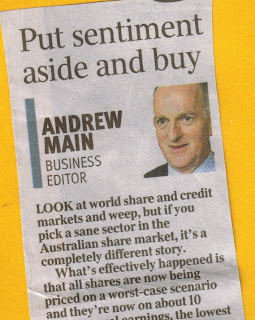 One has to feel some sympathy for Andrew Main, The Australian's business editor. On Friday's front page he pointed out – correctly – that many Australian stocks had fallen to levels which made them attractive buying.
One has to feel some sympathy for Andrew Main, The Australian's business editor. On Friday's front page he pointed out – correctly – that many Australian stocks had fallen to levels which made them attractive buying.When he wrote, Main was not to know that Friday would be long remembered as Black Friday, the day the Australian sharemarket slumped 8.3 per cent – its worst one-day fall since October 22, 1987.
A sharemarket which ended the day 42 per cent lower than its all-time peak last November, at a level which wiped off all the gains of the past five years.
The front-page headline from Saturday's Sydney Morning Herald sums it up. (The Weekend Australian's front-page treatment would not fit on my scanner.)

Yet if Main's advice made sense when he keyed it in last Thursday, it still makes sense. Main pointed out that share prices had dropped to about 10 times annual earnings, the lowest in 24 years. If you bought the good ones at these cheap prices, you'd receive a dividend of about 6.7 per cent if you include franking credits, and there'd be a good chance prices would rise sooner or later.
He concluded: “Once you focus on quality stocks and assess what they actually do, you start to wonder what the fuss is all about.”
The thought could have been addressed more felicitously – does he really think we're being a bit silly in worrying about a 42 per cent slump in our portfolios? – but he's right in one thing. At these depressed prices, a cashed-up investor should be able to find bargains.
As he said, no-one's going to ring a bell when the market bottoms out.
Still, as Main points out in this morning's Australian (in an article I couldn't find posted online), distressed sellers – funds having to meet high levels of redemptions, or individuals receiving margin calls on the loans with which they bought shares in more optimistic times – are the main force now driving share prices down. Reluctantly, these investors may be dumping quality shares just as hard as those of more dubious value – providing opportunities for any investor who can find the cash.
Those investors who already hold quality stocks, and have no pressing debts, may do better to sit out the crisis than try to pick emerging winners. It's a matter for the investor's temperament, as much as anything.
To take one example, it's easy to say, as Main did last Friday, that Woolworths shares have fallen from $34 to $28 at the start of the year, “even though people won't stop shopping for groceries”. Woolworths is a brilliant retailer, and as Main said, people need to shop. But families struggling to pay off credit cards may move to the new Aldi store up the road, where they'll save about 40 per cent on a basket of equivalent quality groceries.
Also, remembering that finance commentator Stephen Mayne has claimed Woolworths is also Australia's biggest poker machine operator through its stake in a Victorian hotel chain, a prudent investor might first examine the company's exposures if a prolonged recession slows people's gambling spend. Perhaps there's a risk, perhaps not.
Also, the investor is invited to count on an uninterrupted commodities boom. But anyone who remembers the end of Japan's “economic miracle” or the Asian “tiger economies” will remain wary.
Indeed, last Friday's sharp fall followed reports that China had asked an iron ore supplier to slow down shipments – a claim the Sydney Morning Herald made its front-page lead at the same time Andrew Main was telling people to “put sentiment aside and buy”.

No comments:
Post a Comment